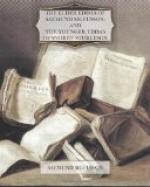158. For the eleventh I know, if I have to lead my ancient friends to battle, under their shields I sing, and with power they go safe to the fight, safe from the fight; safe on every side they go.
159. For the twelfth I know, if on a tree I see a corpse swinging from a halter, I can so grave and in runes depict, that the man shall walk, and with me converse.
160. For the thirteenth I know, if on a young man I sprinkle water, he shall not fall, though he into battle come: that man shall not sink before swords.
161. For the fourteenth I know, if in the society of men I have to enumerate the gods, AEsir and Alfar, I know the distinctions of all. This few unskilled can do.
162. For the fifteenth I know what the dwarf Thiodreyrir sang before Delling’s doors. Strength he sang to the AEsir, and to the Alfar prosperity, wisdom to Hroptatyr.
163. For the sixteenth I know, if a modest maiden’s favour and affection I desire to possess, the soul I change of the white-armed damsel, and wholly turn her mind.
164. For the seventeenth I know, that that young maiden will reluctantly avoid me. These songs, Loddfafnir! thou wilt long have lacked; yet it may be good if thou understandest them, profitable if thou learnest them.
165. For the eighteenth I know that which I never teach to maid or wife of man, (all is better what one only knows. This is the closing of the songs) save her alone who clasps me in her arms, or is my sister.
166. Now are sung the High-one’s songs, in the High-one’s hall, to the sons of men all-useful, but useless to the Jotuns’ sons. Hail to him who has sung them! Hail to him who knows them! May he profit who has learnt them! Hail to those who have listened to them!
FOOTNOTES:
[Footnote 24: The first eight strophes of this composition require an explanation which I am incompetent to afford. They have had many interpreters and as many interpretations. The idea of Odin hanging on a tree would seem to have been suggested by what we read of the grove at Upsala, or Sigtuna, in which the victims offered to that deity were suspended from the trees. In the guise of an unknown wanderer, Odin may be supposed to have been captured and thus offered to himself. It no doubt refers to some lost legend.]
[Footnote 25: Probably, send them (the runes) forth on their several missions.]
[Footnote 26: The miraculous powers here ascribed by Odin to himself bear, in many instances, a remarkable similarity to those attributed to him by Snorri.]
[Footnote 27: The ancient inhabitants of the North believed that the roots of trees were particularly fitted for hurtful trolldom, or witchcraft, and that wounds caused thereby were mortal. In India a similar superstition prevails of the hurtfulness of the roots of trees.]




